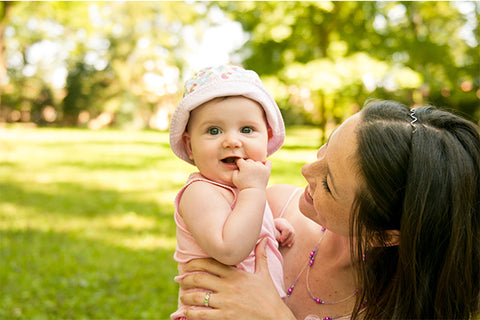Recent Articles
-
The Next Step in Feeding: Pigeon's New Step-Up Accessories
Make weaning easy with Pigeon’s Step-Up Accessories! Designed for a smooth transition from bottle to cup, it offers comfort, confidence, and convenience. -
Do You Really Need a Special Laundry Detergent for Baby? Experts Weigh In
Wondering if you really need a special baby laundry detergent? Learn what experts say about baby skin sensitivity, ingredients to avoid, and how to choose the best detergent for your little one. -
Bottle Acceptance: Expert Tips to Help Your Baby Transition Smoothly
Struggling with bottle refusal? Discover expert tips to help your baby transition smoothly to bottle feeding. From choosing the right nipple to overcoming common challenges, this guide has everything you need for a stress-free switch.
Keeping Your Baby Sun-Safe

Australia is blessed with beautiful weather all year round. And despite the chilly winters in the southern states, there’s still plenty of sun to soak up whether it’s the middle of January or a brisk sunny day in July.
While we adults might be confident in the sun – from applying the right amount of sunscreen, to wearing a hat and long-sleeved clothes or sticking to the shade at a friend’s outdoor barbecue – babies don’t have the same sensibility when it comes to the sun. And with every infant’s skin (not just fair-skinned kids) extremely susceptible to sun damage, it’s important you look out for their safety.
Here are some simple sun-safety tips for your baby:
0–6 months
Newborn babies are much more sensitive to the sun than older children, so it is imperative they are protected from the sun’s UV rays (especially in Australia) any time they are outside. That includes walks in the pram, crawling around in the backyard and even for short trips over to your neighbour’s house.
Their delicate skin contains very little melanin – the pigment that provides protection from UV rays – so it’s up to you as their caregiver to ensure they are properly sun-safe.
So what’s the best protection? Sunscreen, we hear you say? Not so fast – the Cancer Council recommends waiting until your bub is at least six months old before slathering on a bit of sunscreen, mostly due to the sensitivity of their skin. Instead, hats, clothing and sunglasses are your best defence.
Sun-safety recommendations
The first line of defence against UV rays is always clothing.
- Dress your baby in lightweight layers that cover as much skin as possible (without making them too cranky or uncomfortable!).
- Lightweight clothing is essential, as babies are more prone to heatstroke.
- Invest in a wide-brimmed, bucket or legionnaires hat – not only do they offer much better protection than a traditional cap, but they look extra-cute.
- When out for walks on a sunny day, attach a sun-protective cover to your pram.
- Avoid lengthy periods outside between 10am and 4pm (especially during summer) as this is when the sun is at its strongest.
- Slip on a mesh window shield over the back passenger window in your car to protect bub from the harsh sun while driving.
6+ months
At around the six-month mark, your bub will be much more mobile and may even be crawling around. This is the perfect time to support their development by letting them roam around in new areas, including outside in the sun. It’s also at this stage that you can start applying mild amounts of baby-safe sunscreen to your little one.
Sun-safety recommendations
- Sunscreen is a must even on overcast days. Choose a specially formulated baby sunscreen with a high SPF rating – the higher the better!
- Apply sunscreen generously about 15 minutes before heading out and reapply every two hours.
- Doing some swimming lessons in an outdoor pool? Use waterproof sunscreen and reapply after they are towelled down and dry.
What should I do if my baby gets sunburnt?
Despite the best intentions and all possible precautions taken, sometimes kids just get sunburnt. You’ll notice redness on their skin that feels warm to the touch, and they may be a little irritable as well.
More serious sunburn can cause blistering on the affected skin or even fever. If this is the case and your baby is younger than 12 months, seek medical advice from your doctor. Sunburn in infants can be more serious than it appears, so it’s always better to err on the side of caution.
For babies over 12 months (unless the sunburn looks very serious), you can use home remedies by:
- Treating the burn with a cold washer for 10–15 minutes throughout the day.
- Bathing your little one in lukewarm water to cool the skin.
Gently applying a sensitive baby moisturiser or calming cream. Don’t use any petroleum-based creams as they will block heat and sweat from escaping and may make the burn even worse. If your baby is in pain, an over-the-counter baby painkiller can provide some comfort.
- There’s a good chance your baby will be dehydrated from overexposure to the sun, so keep them hydrated with lots of liquids and feeds.
- If you are still breastfeeding, your baby may not want to feed if their sore sunburnt skin is touching you. Bottle-feeds and water from a sippy cup can keep them hydrated, while you can get some relief from a portable breast pump like the Pigeon GoMini Double Electric Breast Pump.
If you have any concerns at any time, please consult your healthcare professional.
Whether it’s summer, winter or anything in between, it’s great to get outside and enjoy the surroundings with your little one. Just remember to stay sun-safe with all the proper precautions.
For more tips and advice, check out our helpful blogs. You can also find exceptional products for breastfeeding, bottle-feeding, oral care and more at our online store.





